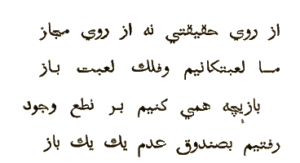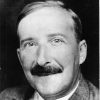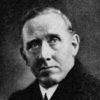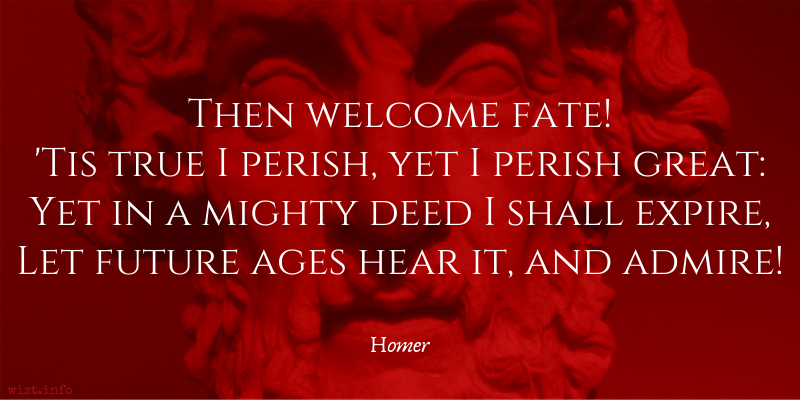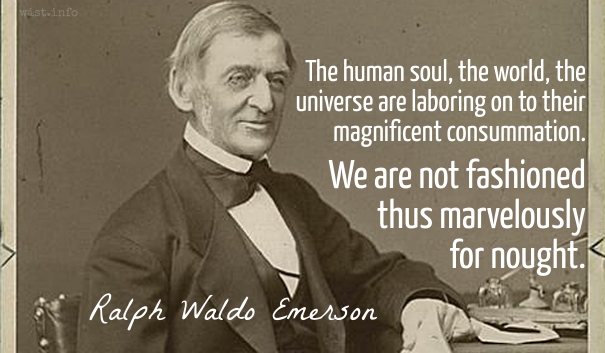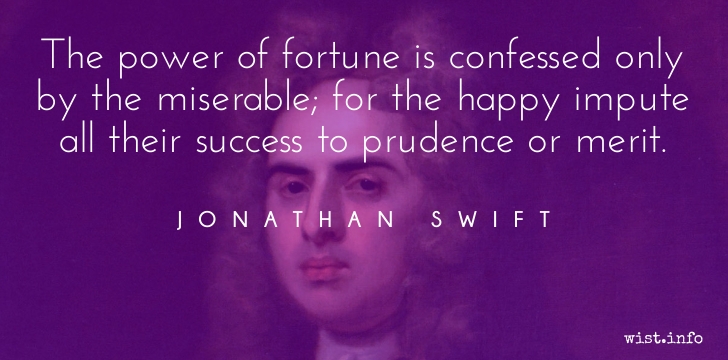Fate always wins. Most of the gods throw dice but Fate plays chess, and you don’t find out until too late that he’s been using two queens all along.
Quotations about:
destiny
Note not all quotations have been tagged, so Search may find additional quotes on this topic.
FIRST WITCH: When shall we three meet again?
In thunder, lightning, or in rain?SECOND WITCH: When the hurly-burly’s done,
When the battle’s lost and won.THIRD WITCH: That will be ere the set of sun.
FIRST WITCH: Where’s the place?
SECOND WITCH: Upon the heath.
THIRD WITCH: There to meet with Macbeth.
William Shakespeare (1564-1616) English dramatist and poet
Macbeth, Act 1, sc. 1, l. 1ff (1.1.1-8) (1606)
(Source)
‘Tis all a Chequer-board of Nights and Days
Where Destiny with Men for Pieces plays:
Hither and thither moves, and mates, and slays,
And one by one back in the Closet lays.
Omar Khayyám (1048-1123) Persian poet, mathematician, philosopher, astronomer [عمر خیام]
Rubáiyát [رباعیات], Bod. # 94 [tr. FitzGerald, 1st ed. (1859), # 49]
(Source)
Alternate translations:
In the view of reality, not of illusion,
We mortals are chess-men and fate is the player;
We each act our game on the board of life,
And then one by one are swept into the box!
[tr. Cowell (1858), # 27]
Impotent Pieces of the Game He plays
Upon this Chequer-board of Nights and Days;
Hither and thither moves, and checks, and slays;
And one by one back in the Closet lays.
[tr. FitzGerald, 2nd ed. (1868), # 74, and 3rd ed. (1872) # 69]
But helpless Pieces of the Game He plays
Upon this Chequer-board of Nights and Days;
Hither and thither moves, and checks, and slays,
And one by one back in the Closet lays.
[tr. FitzGerald, 4th ed. (1879), # 49, and 5th ed. (1889), # 49]
Here, below, we are naught but puppets tor the diversion of the wheel of the heavens. This is indeed a truth, and no simile. We truly are but pieces on this chessboard of humanity, which in the end we leave, only to enter, one by one, into the grave of nothingness.
[tr. McCarthy (1879), # 61]
We are but chessmen, who to move are fain,
Just as the great Chessplayer doth ordain.
It moves us on life's chess-board to and fro,
And then in death's box shuts us up again.
[tr. Whinfield (1882), # 148]
We are but chessmen, destined, it is plain,
That great chess player, Heaven, to entertain;
It moves us on life's chess-board to and fro,
And then in death's box shuts up again.
[tr. Whinfield (1883), # 270]
We are all Puppets of the Sky, we run
As wills the Player till the Game is done,
And when The Player wearies of the Sport,
He throws us into Darkness One by One.
[tr. Garner (1887), 4.2]
But puppets are we in Fate's puppet-show --
No figure of speech is this, but in truth 't is so!
On the draughtboard of Life we are shuffled to and fro,
Then one by one to the box of Nothing go!
[tr. M. K. (1888)]
HERE, BELOW, WE ARE NAUGHT BUT
PUPPETS FOR THE DIVERSION OF THE
WHEEL OF THE HEAVENS. THIS IS
INDEED A TRUTH, AND NO SIMILE.
WE TRULY ARE BUT PIECES ON
THIS CHESSBOARD OF HUMANITY,
WHICH IN THE END WE LEAVE, ONLY
TO ENTER, ONE BY ONE, INTO THE
GRAVE OF NOTHINGNESS.
[tr. McCarthy (1889)]
Upon this checkerboard of joys and woes
The wretched puppet hither and thither goes,
Until the mighty Player of the skies
His plaything back in the casket throws.
[tr. Garner (1898), # 82]
We're the pieces Heaven moves on the chessboard of space
(No metaphor this, but the truth of the case);
Each awhile on Life's board plays his game and returns
In the box of nonentity back to his place.
[tr. Payne (1898), # 480]
To speak plain language, and not in parables,
we are the pieces and heaven plays the game,
we are played together in a baby-game upon the chessboard of existence,
and one by one we return to the box of non-existence.
[tr. Heron-Allen (1898), # 94]
'Tis not a fancy of disordered brains
But certain truth, that on life's checkered square
We men are puppets, whose steps God ordains;
The time is short in which we dally there,
Then in death's casket one by one we fall,
The game is played and earth must cover all.
[tr. Cadell (1899), # 108]
Like helpless chessmen on the checkered blocks,
We 're hither, thither moved, till Heaven knocks
The luckless pieces from the crowded board,
And one by one returns them to the box.
[tr. Roe (1906), # 53]
In truth and not by way of simile.
Heaven plays the game and its mere puppets we;
In sport moved on Life's chess-board, one by one
We reach the chess-box of Nonentity!
[tr. Thompson (1906), # 317]
To speak plain language, parable to shame,
We are the pieces, Heaven plays the game:
A childish game upon the board of Life,
Then back into the Box from whence we came.
[tr. Talbot (1908), # 94]
To speak the truth and not as a metaphor, we are
the pieces of the game and Heaven the player.
We play a little game on the chessboard of existence.
Then we go back to the box of non-existence, one by one.
[tr. Christensen (1927), # 6]
This is not an allegory, it is reality:
We are the figures and the Sphere is the player.
We act a play on the boards of existence
And we go back into the box of non-existence one by one.
[tr. Rosen (1928), # 168]
We puppets dance to tunes of Time we know,
We are puppets in fact, and not for show;
Existence is the carpet where we dance,
So one by one where aught is naught we go.
[tr. Tirtha (1941), # 2.6]
Let me speak out, unallegorically:
We are mere puppets of our Master, toys.
On the Table of Existence, one by one.
Flung back in the toy box of Non-existence.
[tr. Graves & Ali-Shah (1967), # 73]
We are but chessmen in God’s scheme of things:
The most are merely pawns, a few are kings;
And when our unimportant game is done
Back in the box we tumble one by one.
[tr. Bowen (1976), # 44]
We are the puppets and fate the puppeteer
This is not a metaphor, but a truth sincere
On this stage, fate for sometime our moves steer
Into the chest of non-existence, one by one disappear.
[tr. Shahriari (1998), literal]
The hands of fate play our game
We the players are given a name
Some are tame, others gain fame
Yet in the end, we’re all the same.
[tr. Shahriari (1998), figurative]
It may be that everything we do is determined by some grand unified theory. If that theory has determined that we shall die by hanging, then we shall not drown. But you would have to be awfully sure that you were destined for the gallows to put to sea in a small boat during a storm. I have noticed that even people who claim that everything is predestined and that we can do nothing to change it look before they cross the road. Maybe it’s just that those who don’t look don’t survive to tell the tale.
Stephen Hawking (1942-2018) English physicist, author
“Is Everything Determined?” lecture, Sigma Club Seminar, Cambridge University (1990-04)
(Source)
Reprinted in Black Holes and Baby Universes, and Other Essays, ch. 12 (1994). Hawking's thesis that the universe is actually deterministic, but too complex to be predictable, so acting as though free will exists is useful socially and, like fluid dynamics equations, satisfactory for most purposes.
Chance is necessity hidden behind a veil.
[Zufall ist die in Schleier gehüllte Nothwendigkeit.]
Marie von Ebner-Eschenbach (1830-1916) Austrian writer
Aphorisms [Aphorismen], No. 10 (1880) [tr. Scrase/Mieder (1994)]
(Source)
Yet they, believe me, who await
No gifts from chance, have conquered fate.Matthew Arnold (1822-1888) English poet and critic
“Resignation,” The Strayed Reveller and Other Poems (1848)
(Source)
O human beings, you’re born to fly straight up,
Why does a little gust of wind bring you down?
[O gente umana, per volar sù nata,
perché a poco vento così cadi?]Dante Alighieri (1265-1321) Italian poet
The Divine Comedy [Divina Commedia], Book 2 “Purgatorio,” Canto 12, l. 95ff (12.95-96) (1314) [tr. Bang (2019)]
(Source)
Some translators have this as a comment by Dante on how few takers there are to the Angel of Humility's invitation to ascend higher; others, including most modern translators, make it part of the Angel's speech.
(Source (Italian)). Alternate translations:
Ye Souls for Heav'n design'd! ye Sons of Day!
Why should a random breeze o'erset your fail
When heav'n-ward bound?
[tr. Boyd (1802), st. 18]
O ye race of men
Though born to soar, why suffer ye a wind
So slight to baffle ye?
[tr. Cary (1814)]
O human race! whose birthright is to soar,
How little wind will make your course give o'er!
[tr. Bannerman (1850)]
O human creatures, born to soar aloft,
Why fall ye thus before a little wind?
[tr. Longfellow (1867)]
O race of men, born to fly upward, why at a little wind fall ye so down?
[tr. Butler (1885)]
O human race, though born above to soar,
Why at the slightest breath dost thou thus fall ?
[tr. Minchin (1885)]
O human race, born to fly upward, why before a little wind dost thou so fall?
[tr. Norton (1892)]
O human folk, born to fly upward, why at a breath of wind thus fall ye down?
[tr. Okey (1901)]
O race of men, born to fly upward, why do you fall back so for a little wind?
[tr. Sinclair (1939)]
O human spirits, upward born to spring,
Why fall ye down at a brief blast of air?
[tr. Binyon (1943)]
O human race, born to take flight and soar,
Why fall ye, for one breath of wind, to earth?
[tr. Sayers (1955)]
O sons of man, born to ascend on high,
how can so slight a wind-puff make you fall?
[tr. Ciardi (1961)]
O race of men, born to fly upward,
why do you fall so at a breath of wind?
[tr. Singleton (1973)]
O race of men, born to fly heavenward,
how can a breath of wind make you fall back?
[tr. Musa (1981)]
O human race, born to fly upwards,
Why do you fall at such a little breeze?
[tr. Sisson (1981)]
O humankind, born for the upward flight,
why are you driven back by wind so slight?
[tr. Mandelbaum (1982)]
O human race, born to fly upward, why do you fall at so little wind?
[tr. Durling (2003)]
O human race, born to soar, why do you fall so, at a breath of wind?
[tr. Kline (2002)]
O human nature! You are born to fly!
Why fail and fall at, merely, puffs of wind?
[tr. Kirkpatrick (2007)]
O race of man, born to fly on high,
why does a puff of wind cause you to fall?
[tr. Hollander/Hollander (2007)]
O human race, born to fly on high,
How can the slightest breeze blow dust in your eyes?
[tr. Raffel (2010)]
Titan! to thee the strife was given
Between the suffering and the will,
Which torture where they cannot kill;
And the inexorable Heaven,
And the deaf tyranny of Fate,
The ruling principle of Hate,
Which for its pleasure doth create
The things it may annihilate,
Refused thee even the boon to die:
The wretched gift Eternity
Was thine — and thou hast borne it well.
All has its date below; the fatal hour
Was register’d in Heav’n ere time began.
We turn to dust, and all our mightiest works
Die too.William Cowper (1731-1800) English poet
The Task, Book 5 “The Winter Morning Walk,” l. 529ff (1785)
(Source)
It seems that life is not easy for any of us. But what of that? We must have perseverance and above all confidence in ourselves. We must believe that we are gifted for something, and that this thing, at whatever cost, must be attained.
[La vie n’est facile pour aucun de nous. Mais quoi, il faut avoir de la persévérance, et surtout de la confiance en soi. Il faut croire que l’on est doué pour quelque chose, et que, cette chose, il faut l’atteindre coûte que coûte.]
Marie Curie (1867-1934) Polish-French physicist and chemist [b. Maria Salomea Skłodowska]
Letter to her brother Joseph (1894-03-18)
(Source)
(French (Source))
As quoted in Eve Curie Labouisse, Madame Curie: A Biography, ch. 9 (1937) [tr. Sheean (1938)].
Now, now, my sister, the Fates are in command.
Don’t hold me back. Where God and relentless
Fortune call us on, that’s the way we go![Iam iam fata, soror, superant; absiste morari;
quo deus et quo dura vocat Fortuna, sequamur.]Virgil (70-19 BC) Roman poet [b. Publius Vergilius Maro; also Vergil]
The Aeneid [Ænē̆is], Book 12, l. 676ff (12.676-677) [Turnus] (29-19 BC) [tr. Fagles (2006)]
(Source)
Declaring to his sister that, despite her attempts to protect him, Fate dictates he face Aeneas in (likely fatal) battle.
(Source (Latin)). Alternate translations:
Fate calls now, sister, there is no delay:
What God and hard chance bids, we must obey.
[tr. Ogilby (1649)]
Sister, the Fates have vanquish'd: let us go
The way which Heav'n and my hard fortune show.
[tr. Dryden (1697)]
Sister, now, now, destiny prevails; forbear to stop me; let us follow whither god and rigid fortune calls.
[tr. Davidson/Buckley (1854)]
The Fates, the Fates must have their way:
O sister! cease to breed delay:
Where Heaven and cruel Fortune call,
There let me follow to my fall.
[tr. Conington (1866)]
Now, sister, now the fates prevail.
Bid me not pause. Wherever Heaven may lead
And Fortune stern, let us pursue our course.
[tr. Cranch (1872), l. 856ff]
Now, O my sister, now fate prevails: cease to hinder; let us follow where deity and stern fortune call.
[tr. Mackail (1885)]
Now, sister, now the Fates prevail! no more for tarrying try.
Nay, let us follow where the God, where hard Fate calleth me!
[tr. Morris (1900)]
"Sister," he cries, "Fate conquers; let us go
The way which Heaven and cruel fortune show."
[tr. Taylor (1907), st. 88, l. 787ff]
Fate is too strong, my sister! Seek no more
to stay the stroke. But let me hence pursue
that path where Heaven and cruel Fortune call.
[tr. Williams (1910)]
Now, my sister, now Fate triumphs: cease to hinder; where God and cruel Fortune call, let us follow!
[tr. Fairclough (1918)]
Fate is the winner now; keep out of my way,
My sister: now I follow god and fortune.
[tr. Humphries (1951)]
The fates are too strong for me, sister -- I see it now. Don't hold me back;
Let me go where God and my own unmerciful fortune call me.
[tr. Day-Lewis (1952)]
Sister, fate has won; do not
delay me; let us follow where both god
and cruel fortune call.
[tr. Mandelbaum (1971), l. 900ff]
Ah, sister, see, fate overpowers us.
No holding back now. We must follow where
The god calls, or implacable Fortune calls.
[tr. Fitzgerald (1981), l. 915ff]
"Sister," he said, "the time has come at last. The Fates are too strong. You must not delay them any longer. Let us go where God and cruel fortune call me."
[tr. West (1990)]
Now, sister, now fate triumphs: no more delays:
where god and cruel fortune calls, let me follow.
[tr. Kline (2002)]
Now, Sister, the Fates triumph at last.
Stop holding me back. We will follow
Where God and cruel Fortune call us.
[tr. Lombardo (2005)]
Sister, fate has won. Stop delaying me.
Let's go where Jove and heartless Fortune call.
[tr. Bartsch (2021)]
Vesuvius, once latticed with vine shade,
With grapes from which the richest wine was made —
This is where Bacchus had his favorite haunt
And Satyrs could their wildest dances vaunt.
Here Venus more than Sparta made her place.
Here Hercules brought blessings for the race.
What once in beauty and renown was cherished
In fire and ashes has with horror perished.
Were it allowed immortal gods to rue it,
They would have wished they were not doomed to do it.[Hic est pampineis viridis modo Vesbius umbris,
Presserat hic madidos nobilis uva lacus:
Haec iuga, quam Nysae colles, plus Bacchus amavit,
Hoc nuper Satyri monte dedere choros.
Haec Veneris sedes, Lacedaemone gratior illi,
Hic locus Herculeo numine clarus erat.
Cuncta iacent flammis et tristi mersa favilla:
Nec superi vellent hoc licuisse sibi.]Martial (AD c.39-c.103) Spanish Roman poet, satirist, epigrammatist [Marcus Valerius Martialis]
Epigrams [Epigrammata], Book 4, epigram 44 (4.44) (AD 89) [tr. Wills (2007)]
(Source)
On the eruption of Mt. Vesuvius in AD 79, which destroyed the towns of Pompeii (whose patron was Venus) and Herculaneum (supposedly founded by Hercules), as well as much of the surrounding countryside.
(Source (Latin)). Alternate translations:
Vesuvius shaded once with greenest vines,
Where pressed grapes did yield the noblest wines.
Which hills far more they say Bacchus lov'd,
Where Satyrs once in mirthfull dances mov'd,
Where Venus dwelt, and better lov'd the place
Than Sparta; where Alcides Temple was,
Is now burnt downe, rak'd up in ashes sad.
The gods are griev'd that such great power they had.
[tr. May (1629)]
Vesuvio, cover'd with the fruitful vine,
Here flourish'd once, and ran with floods of wine.
here Bacchus oft to the cool shades retir'd,
And his own native Nisa less admir'd:
Oft to the mountain's airy tops advanc'd,
The frisking Satyrs on the summits danc'd.
Alcides here, here Venus grac'd the shore,
Nor lov'd her fav'rite Lacedæmon more!
Now piles of ashes , spreading all around
In undistinguish'd heaps, deform the ground.
The gods themselves the ruin'd seats bemoan;
And blame the mischiefs that themselves have done.
[tr. Addison (1705)]
Vesuvius this! So lately crown'd with vines!
Whence in full currents flowed the generous wines!
By Bacchus more than Nysa's hills belov'd!
Upon whose top in dance the satyrs mov'd!
The seat of Venus, more than Sparta dear!
Proud of her name Heraclea once was here!
All drown'd in flames! with ashes cover'd o'er!
the gods, who caus'd the ill, their power deplore.
[tr. Hay (1755)]
Here Vesuvius late with rich festoons was green:
Here noblest clusters gusht a lake serene.
These beyond Nysa's hights the god advanc'd:
On this glad moutnain gamesom satyrs danc'd.
This, more than Sparta, joy'd the laughing dame:
These summits prouden'd by Alcides' name.
Smoke, embers, flames, have laid the glories low:
The pow'rs regret the very pow'r they glow.
[tr. Elphinston (1782), Book 4, part 1, ep. 33]
Yonder is Vesuvius, lately verdant with the shadowy vines; there a noble grape under pressure yielded copious lakes of wine; that hill Bacchus preferred to the hills of Nysa; there lately the Satyrs led their dances; there Venus had a residence more agreeable to her than Lacedæmon; that spot was made illustrious by the name of Hercules. Now, every thing is laid low by flames, and is buried under the sad ashes. Surely the Gods must regret that they possessed so much power for mischief.
[tr. Amos (1858), ch. 7, ep. 167]
This is Vesuvius, lately green with umbrageous vines; here the noble grape had pressed the dripping coolers. These are the heights which Bacchus loved more than the hills of Nysa; on this mountain the satyrs recently danced. This was the abode of Venus, more grateful to her than Lacedaemon; this was the place renowned by the divinity of Hercules. All now lies buried in flames and sad ashes. Even the gods would have wished not to have had the power to cause such a catastrophe.
[tr. Bohn's Classical (1859)]
This is Vesbius, green yesterday with viny shades; here had the noble grape loaded the dripping vats; these ridges Bacchus loved more than the hills of Nysa; on this mount of late the Satyrs set afoot their dances; this was the haunt of Venus, more pleasant to her than Lacedaemon; this spot was made glorious by the name of Hercules. All lies drowned in fire and melancholy ash; even the High Gods could have wished this had not been permitted them.
[tr. Ker (1919)]
Fair were thy shading vines and rich to fill
The overflowing wine-press year by year,
Bacchus hath loved thee more than Nysa’s hill,
Vesuvius, for his fauns held revel here;
Sweet Venus held no other haunt so dear,
Alcides made thee glorious with his name,
Flame-swept art thou, a waste of ashes drear,
And heaven remorseful hides its face for shame.
[tr. Pott & Wright (1921)]
Vesuvius here was green with mantling vine,
Here brimming vats o'erflowed with noble wine.
These hills to jocund Bacchus were more dear
Than Nysa, and the Satyrs reveled here.
This blest retreat could Cytherea please,
This owned the fame of godlike Hercules;
Now dismal ashes all and scorching flame.
Such dire caprice might move a god to shame.
[tr. Francis & Tatum (1924), ep. 84]
Behold Vesuvius, lately green
With vineyard-covered slopes!
Here did the noble grapevine yield
Beyond one's wildest hopes!
Here are the ridges Bacchus loves
More than those of his youth.
And here till late his Satyrs danced
There merry dance uncouth.
Here stood Pompeii, dearer far
To Aphrodite than
The Lacedaemonian island where
Her early life began.
And here stood Herculaneum,
Founded by Hercules
Where here he paused to rest the oxen
Of Geryones.
All this, by fire and flame consumed,
Lies sunk, so sad a sight
The very gods might wish they had
Not had it in their might.
[tr. Marcellino (1968)]
Only a short while ago old smoky Vesuvius
bore a green burden of vineyards on his shoulders
and the vats below were clogged with gorgeous grapes.
This was a place whose forests high in the air meant more to Bacchus than his Nysean hills.
And only a short while ago Satyrs led their troupes down this same mountainside. Here were Venus’ haunts
more appealing to her than Sparta.
And this whole landscape knew the sound of Hercules’ roving name. He too made it holy.
And now, there it lies submerged in ashes,
crumpled, shorn by the flames,
so curiously at odds
with the will of the gods
[tr. Bovie (1970)]
Hear the testament of death:
yesterday beneath Vesuvius' side
the grape ripened in green shade,
the dripping vats with their viny tide
squatted on hill turf: Bacchus
loved this land more than fertile Nysa:
here the satyrs ran, this was Venus' home,
sweeter to her than Lacedaemon
or the rocks of foam-framed Cyprus.
One city now in ashes the great name
of Hercules once blessed, one other
to the salty sea was manacled.
All is cold silver, all fused with death
murdered by the fire of Heaven. Even
the Gods repent this faculty
that power of death which may not be recalled.
[tr. Porter (1972)]
This is Vesuvius, yesterday green with shady vines.
Here notable grapes weighted down the wine-steeped vats.
These the heights that Bacchus loved more than Nysa's hills.
On this mountain the Satyrs began their dances lately.
This was Venus' seat, more pleasing to her than Sparta.
This place was made renowned by Hercules' godhead.
All lies sunk in flames and bleak ash. Even the high gods
Could wish that this had not been allowed to them.
[tr. Shepherd (1987)]
This is Vesuvius, but lately green with shade of vines. Here the noble grape loaded the vats to overflowing. These slopes were more dear to Bacchus than Nysa's hills, on this mountain not long ago Satyrs held their dances. This was Venus' dwelling, more pleasing to her than Lacedaemon, this spot the name of Hercules made famous. All lies sunk in flames and drear ashes. The High Ones themselves would rather this had not been in their power.
[tr. Shackleton Bailey (1993)]
Here is Vesuvius, viney and shade-green only yesterday;
here, on these slopes Bacchus loved more than Nysa’s hills,
the noble grapes outgave themselves time and again;
on this mountain the Satyrs leaped and danced,
for this was Venus’s adopted home, dearer to her than Sparta,
and here a proud town bore the name of Hercules.
It’s all drowned now by fire, sunk to drab ash. What won’t
the high gods permit themselves, they could well ask.
[tr. Matthews (1995)]
This is Vesuvius, green just now with vines;
here fine grapes loaded brimming vats. These heights
were loved by Bacchus more than Nysa's slopes;
on this mount, satyrs lately danced their rites.
this home of Venus pleased her more than Sparta;
this spot the name of Hercules made proud.
All lie engulfed in flames and dismal ashes:
the gods themselves regret it was allowed.
[tr. McLean (2014)]
No longer dream that human prayer
The will of Fate can overbear.[Desine fata deum flecti sperare precando.]
Virgil (70-19 BC) Roman poet [b. Publius Vergilius Maro; also Vergil]
The Aeneid [Ænē̆is], Book 6, l. 176ff (6.176) [The Sybil] (29-19 BC) [tr. Conington (1866)]
(Source)
Speaking to dead Palinurus.
(Source (Latin)). Alternate translations:
Desist to hope that fates will heare thy prayer
[tr. Ogilby (1649)]
Fate, and the dooming gods, are deaf to tears.
[tr. Dryden (1697)]
Cease to hope that the decrees of the gods are to be altered by prayers.
[tr. Davidson/Buckley (1854)]
Cease to hope
By prayers to bend the destinies divine.
[tr. Cranch (1872)]
Cease to hope prayers may bend the decrees of heaven.
[tr. Mackail (1885)]
Hope not the Fates of very God to change by any prayer.
[tr. Morris (1900)]
Hope not by prayer to bend the Fates' decree.
[tr. Taylor (1907), st. 51, l. 454]
Hope not by prayer to change the laws of Heaven!
[tr. Williams (1910)]
Cease to dream that heaven's decrees may be turned aside by prayer.
[tr. Fairclough (1916)]
Give up the hope
That fate is changed by praying.
[tr. Humphries (1951)]
Give up this hope that the course of fate can be swerved by prayer.
[tr. Day-Lewis (1952)]
Leave any hope that prayer can turn aside
the gods' decrees.
[tr. Mandelbaum (1971), ll. 495-96]
Abandon hope by prayer to make the gods
Change their decrees.
[tr. Fitzgerald (1981), ll. 506-7]
You must cease to hope that the Fates of the gods can be altered by prayers.
[tr. West (1990)]
Cease to hope that divine fate can be tempered by prayer.
[tr. Kline (2002)]
Stop hoping that the gods' decrees
Can be bent with prayer.
[tr. Lombardo (2005)]
Hope no more
the gods’ decrees can be brushed aside by prayer,
[tr. Fagles (2006), l. 428-29]
As if the gods' fates could be bent by prayer.
[tr. Bartsch (2021)]
Yield not to evils, but the bolder thou
Persist, defiant of misfortune’s frown,
And take the path thy Destinies allow.[Tu ne cede malis, sed contra audentior ito
Quam tua te fortuna sinet.]Virgil (70-19 BC) Roman poet [b. Publius Vergilius Maro; also Vergil]
The Aeneid [Ænē̆is], Book 6, l. 95ff (6.95-96) [The Sybil] (29-19 BC) [tr. Taylor (1907), st. 15, ll. 12]
(Source)
Stoic maxim. There is argument as to whether it should be quam or qua, leading to some variations in translating the second half of the quotation.
(Source (Latin)). Alternate translations:
Yet dangers fear not, but on bolder goe,
What course thy fortune grants
[tr. Ogilby (1649)]
But thou, secure of soul, unbent with woes,
The more thy fortune frowns, the more oppose.
[tr. Dryden (1697)]
Yield not under your sufferings, but encounter them with greater boldness than your fortune shall permit.
[tr. Davidson/Buckley (1854)]
Yet still despond not, but proceed
Along the path where Fate may lead.
[tr. Conington (1866)]
Yet yield not thou, but go more boldly on,
Where Fortune leads, till victory be won.
[tr. Cranch (1872), ll. 121-122]
Yield not thou to distresses, but all the bolder go forth to meet them, as thy fortune shall allow thee way.
[tr. Mackail (1885)]
But thou, yield not to any ill, but set thy face, and wend
The bolder where thy fortune leads.
[tr. Morris (1900)]
Oh! yield not to thy woe, but front it ever,
And follow boldly whither Fortune calls.
[tr. Williams (1910)]
Yield not thou to ills, but go forth to face them more boldly than thy Fortune shall allow thee!
[tr. Fairclough (1916)]
Do not yield to evil,
Attack, attack, more boldly even than fortune
Seems to permit.
[tr. Humphries (1951)]
But never give way to those evils: face them all the more boldly,
Using what methods your luck allows you.
[tr. Day-Lewis (1952)]
Do not relent before distress, but be
far bolder than your fortune would permit.
[tr. Mandelbaum (1971), ll. 132-33]
Never shrink from blows.
Boldly, more boldly where your luck allows,
Go forward, face them.
[tr. Fitzgerald (1981), ll. 143-45]
You must not give way to these adversities but must face them all the more boldly wherever your fortune allows it.
[tr. West (1990)]
Do not give way to misfortunes, meet them more bravely,
as your destiny allows.
[tr. Kline (2002)]
Do not yield, but oppose your troubles
All the more boldly, as far as your fate
And fortune allow.
[tr. Lombardo (2005)]
But never bow to suffering, go and face it,
all the bolder, wherever Fortune clears the way.
[tr. Fagles (2006), ll. 113-14]
Don’t yield to evils, but go boldly forward
Where your fortune bids you.
[tr. @sentantiq (2018)]
Don't give up at these misfortunes. Be as brave as Fortune lets you.
[tr. Bartsch (2021)]
Goddess-born, wherever
Fate pulls or hauls us, there we have to follow;
Whatever happens, fortune can be beaten
By nothing but endurance.[Nate dea, quo fata trahunt retrahuntque, sequamur;
Quidquid erit, superanda omnis fortuna ferendo est.]Virgil (70-19 BC) Roman poet [b. Publius Vergilius Maro; also Vergil]
The Aeneid [Ænē̆is], Book 5, l. 709ff (5.709-710) [Nautes] (29-19 BC) [tr. Humphries (1951)]
(Source)
Nautes encouraging Achilles after fire destroys some of the ships. Sometimes paraphrased in two separate phrases:
(Source (Latin)). Alternate translations:
- Quocunque trahunt fata sequamur. -- Wherever the Fates direct us, let us follow.
- Superanda omnis fortuna ferendo est. -- Every misfortune is to be subdued by patience.
What ere the mighty ire
Of gods portend, or what the fates require,
We must endure. Comforting, he begun
Thus to Aeneas: O thou Goddesse son,
Let us obey the fates; whatever chance,
All fortunes vanquish'd are by sufferance.
[tr. Ogilby (1649)]
O goddess-born, resign'd in ev'ry state,
With patience bear, with prudence push your fate.
By suff'ring well, our Fortune we subdue;
Fly when she frowns, and, when she calls, pursue.
[tr. Dryden (1697)]
Goddess-born, let us follow the Fates, whether they invite us backward or forward: come what will, every fortune is to be surmounted by patience.
[tr. Davidson/Buckley (1854)]
My chief, let Fate cry on or back,
'Tis ours to follow, nothing slack:
Whate'er betide, he only cures
The stroke of fortune who endures.
[tr. Conington (1866)]
Wherever Fate may lead us, whether on
Or backward, let us follow. Whatsoe'er
Betides, all fortune must be overcome
By endurance.
[tr. Cranch (1872), l. 840ff]
Goddess-born, follow we fate's ebb and flow, whatsoever it shall be; fortune must be borne to be overcome.
[tr. Mackail (1885)]
O Goddess-born, Fate's ebb and flow still let us follow on,
Whate'er shall be, by bearing all must Fortune's fight be won.
[tr. Morris (1900)]
O Goddess-born, where Fate directs the way,
'Tis ours to follow. Who the best can bear,
Best conquers Fortune, be the doom what may.
[tr. Taylor (1907), st. 97, l. 865ff]
O goddess-born, we follow here or there,
as Fate compels or stays. But come what may,
he triumphs over Fortune, who can bear
whate'er she brings.
[tr. Williams (1910)]
Goddess-born, whither the Fates, in their ebb and flow, draw us, let us follow ; whatever befall, all fortune is to be o'ercome by bearing.
[tr. Fairclough (1916)]
Goddess-born, let us follow our destiny, ebb or flow.
Whatever may happen, we master fortune by fully accepting it.
[tr. Day-Lewis (1952)]
O goddess-born, there where the fates would have us
go forward or withdraw, there let us follow;
whatever comes, all fortune must be won
by our endurance.
[tr. Mandelbaum (1971), l. 934ff]
Sir, born of an immortal, let us follow
Where our fates may lead, or lead us back.
Whatever comes,
All Fortune can be mastered by endurance.
[tr. Fitzgerald (1981)]
Son of the goddess, let us follow the Fates, whether they lead us on or lead us back. Whatever fortune may be ours, we must at all times rise above it by enduring it.
[tr. West (1990)]
Son of the Goddess, let us follow wherever fate ebbs or flows,
whatever comes, every fortune may be conquered by endurance.
[tr. Kline (2002)]
Son of Venus, whether the Fates will draw us on
or draw us back, let’s follow where they lead.
Whatever Fortune sends, we master it all
by bearing it all, we must!
[tr. Fagles (2006)]
Goddess-born, let's follow where fate draws us, even if we backtrack. Come what may, we'll win out by endurance.
[tr. Bartsch (2021)]
And, oh! whate’er Heaven destined to betide,
Let neither flattery soothe, nor pity hide.
Prepared I stand: he was but born to try
The lot of man; to suffer, and to die.[πέρι γάρ μιν ὀιζυρὸν τέκε μήτηρ.
μηδέ τί μ᾽ αἰδόμενος μειλίσσεο μηδ᾽ ἐλεαίρων,
ἀλλ᾽ εὖ μοι κατάλεξον ὃπως ἤντησας ὀπωπῆς.]Homer (fl. 7th-8th C. BC) Greek author
The Odyssey [Ὀδύσσεια], Book 3, l. 96ff (3.96) (c. 700 BC) [tr. Pope (1725), l. 114ff]
(Source)
Telemachus seeking to learn from Nestor of the fate of his father, Odysseus. Telemachus later repeats these words in seeking news of his father from Menelaus (4.326). (Source (Greek)). Alternate translations:
[T]he unhappy wanderer,
To too much sorrow whom his mother bore.
You then by all your bounties I implore,
[...] that in nought applied
To my respect or pity you will glose,
But uncloth’d truth to my desires disclose
[tr. Chapman (1616)]
[B]orn to calamity.
Let no respect, or pity mitigate
Your story, howsoever sad it be.
Nothing but naked truth to me relate.
[tr. Hobbes (1675), l. 85ff]
For my father at his birth
Was, sure, predestin’d to no common woes.
Neither through pity, or o’erstrain’d respect
Flatter me, but explicit all relate
Which thou hast witness’d.
[tr. Cowper (1792), l. 120ff]
How hath his mother to exceeding teen
borne him! Let no kind thought thy tidings screen;
Paint not the tale through pity.
[tr. Worsley (1861), st. 12]
For sure a woeful wight his mother bore him!
Extenuate naught for shame or pity's sake,
But tell me all, as thou hast chanced to see!
[tr. Bigge-Wither (1869), l. 95ff]
His mother bare him to exceeding sorrow. And speak me no soft words in ruth or pity, but tell me plainly what sight thou didst get of him.
[tr. Butcher/Lang (1879)]
This man, his mother bore him to most exceeding woe --
But have no respect of my sorrow nor be soft and soothing now,
But tell all out unto me, in what wise the man thou hast seen.
[tr. Morris (1887), l. 95ff]
To exceeding grief his mother bore him. Use no mild word, no yield to pity, from regard for me, but tell me fully all you chanced to see.
[tr. Palmer (1891)]
He was a man born to trouble. Do not soften things out of any pity for me, but tell me in all plainness exactly what you saw.
[tr. Butler (1898)]
For beyond all men did his mother bear him to sorrow. And do thou nowise out of ruth or pity for me speak soothing words, but tell me truly how thou didst come to behold him.
[tr. Murray (1919)]
Even from his mother's womb, calamity had marked him for her own. Do not in pity convey to me smooth things, things gentler than the truth: blurt out, rather, all that met your sight.
[tr. Lawrence (1932)]
For if ever a man was born for misery, it was he. Do not soften your account out of pity or concern for my feelings, but faithfully describe the scene that met your eyes.
[tr. Rieu (1946)]
The man was born for trouble. Spare me no part for kindness' sake; be harsh; but put the scene before me as you saw it.
[tr. Fitzgerald (1961)]
His mother bore this man to be wretched. Do not soften it because you pity me and are sorry for me, but fairly tell me all that your eyes have witnessed.
[tr. Lattimore (1965)]
She who gave birth to him gave birth to grief. You need not sweeten anything for me. Forget discretion, set aside your pity: tell me completely -- all you chanced to see.
[tr. Mandelbaum (1990)]
More than all other men, that man was born for pain.
Don't soften a thing, from pity, respect for me --
tell me, clearly, all your eyes have witnessed.
[tr. Fagles (1996)]
He was born to sorrow.
More than any man on earth. And do not,
Out of pity, spare me the truth, but tell me
Whatever you have seen, whatever you know.
[tr. Lombardo (2000), l. 104ff]
For his mother indeed bore him to be woeful. Spare me nothing, extenuate nothing, nor show any pity; tell me all to the end, however it came to your notice.
[tr. Merrill (2002)]
For if ever a man was born to suffer it was he. Do not soften your account out of pity or concern for my feelings, but faithfully describe the scene that met your eyes.
[tr. D C H Rieu (2002)]
More than any other man his mother bore him for wretchedness. Do not let respect or pity for me soften your words, but tell me exactly how you chanced to see him.
[tr. Verity (2016)]
He was surely born to suffer in extraordinary ways. Please do not try to sweeten bitter news from pity; tell me truly if you saw him, and how he was.
[tr. Wilson (2017)]
To unmatched sorrow his mother bore him! And don't, from concern or pity, speak false comfort to me, but tell me exactly what you may have witnessed!
[tr. Green (2018)]
For his mother bore him
to go through trouble more than other men.
Do not pity me or, from compassion,
just offer me kind words of consolation,
but tell me truly how you chanced to see him.
[tr. Johnston (2019), l. 119ff]
Only ambition is fired by the coincidences of success and easy accomplishment but nothing is quite as splendidly uplifting to the heart as the defeat of a human being who battles against the invincible superiority of fate. This is always the most grandiose of all tragedies, one sometimes created by a dramatist but created thousands of times by life.
“Inevitability” is a magic word with which to mesmerize the unwary. Only death is inevitable. Short of that, nothing is inevitable until it happens, and everything is inevitable once it has happened. The historian deals with past events and therefore to him all history is inevitable. But these past events were once in the future, and then they were not inevitable.
Perhaps the hardest thing for humans to do is to imagine the world as it is imagined by others. We tend to confuse acting in accordance with the goals and values of the society in which we live with rationality; we tend to confuse intelligence with thinking in accordance with those goals and values. And, of course, we are always inclined to see events as predetermined — and we are almost always wrong.
Masha Gessen (b. 1967) Russian-American journalist, author, translator, activist
“The Fundamental Uncertainty of Mueller’s Russia Indictments,” The New Yorker (20 Feb 2018)
(Source)
If fate means you to lose, give him a good fight anyhow.
Then welcome fate!
‘Tis true I perish, yet I perish great:
Yet in a mighty deed I shall expire,
Let future ages hear it, and admire![νῦν αὖτέ με μοῖρα κιχάνει.
μὴ μὰν ἀσπουδί γε καὶ ἀκλειῶς ἀπολοίμην,
ἀλλὰ μέγα ῥέξας τι καὶ ἐσσομένοισι πυθέσθαι.]Homer (fl. 7th-8th C. BC) Greek author
The Iliad [Ἰλιάς], Book 22, l. 303ff (22.303) [Hector] (c. 750 BC) [tr. Pope (1715-20), l. 385ff]
(Source)
Original Greek. Alternate translations:
But Fate now conquers; I am hers; and yet not she shall share
In my renown; that life is left to every noble spirit,
And that some great deed shall beget that all lives shall inherit.
[tr. Chapman (1611), l. 266ff]
But I will not fall
Inglorious; I will act some great exploit
That shall be celebrated ages hence.
[tr. Cowper (1791), l. 347ff]
Fate overtakes me. Nevertheless I will not perish cowardly and ingloriously at least, but having done some great deed to be heard of even by posterity.
[tr. Buckley (1860)]
My fate hath found me now.
Yet not without a struggle let me die,
Nor all inglorious; but let some great act,
Which future days may hear of, mark my fall.
[tr. Derby (1864)]
Now my fate hath found me. At least let me not die without a struggle or ingloriously, but in some great deed of arms whereof men yet to be born shall hear.
[tr. Leaf/Lang/Myers (1891)]
My doom has come upon me; let me not then die ingloriously and without a struggle, but let me first do some great thing that shall be told among men hereafter.
[tr. Butler (1898)]
Now again is my doom come upon me. Nay, but not without a struggle let me die, neither ingloriously, but in the working of some great deed for the hearing of men that are yet to be.
[tr. Murray (1924)]
But now my death is upon me. Let me at least not die without a struggle, inglorious, but do some big thing first, that men to come shall know of it.
[tr. Lattimore (1951)]
Now the appointed time's upon me. Still, I would not die without delivering a stroke, or die ingloriously, but in some action memorable to men in days to come.
[tr. Fitzgerald (1974)]
So now I meet my doom. Well let me die --
but not without struggle, not without glory, no,
in some great clash of arms that even men to come
will hear of down the years!
[tr. Fagles (1990), l. 359ff]
But now has my doom overcome me. But let me at least not die without making a fight, without glory, but a great deed having done for the men of the future to hear of.
[tr. Merrill (2007)]
May I not die without a fight and without glory
but after doing something big for men to come to learn about.
[tr. @Sentantiq (2011)]
“So, Jeeves!”
“Yes, sir.”
“What do you mean. Yes, sir?”
“I was endeavouring to convey my appreciation of the fact that your position is in many respects somewhat difficult, sir. But I wonder if I might call your attention to an observation of the Emperor Marcus Aurelius. He said: ‘Does aught befall you? It is good. It is part of the destiny of the Universe ordained for you from the beginning. All that befalls you is part of the great web.'”
I breathed a bit stertorously.
“He said that, did he?”
“Yes, sir.”
“Well, you can tell him from me he’s an ass.”
P. G. Wodehouse (1881-1975) Anglo-American humorist, playwright and lyricist [Pelham Grenville Wodehouse]
The Mating Season, ch. 4 (1949)
(Source)
Adapted from Marcus Aurelius, Meditations, Book 4, #26 [tr. Rendall (1901)].
Wodehouse uses in "Ordeal by Golf" (1919) a similar sentiment from Meditations, Book 10, #5, to suggest Marcus Aurelius was a golfer.
Imitate the spirit of Marcus Aurelius. "Whatever may befall thee," says that great man in his "Meditations," "it was preordained for thee from everlasting. Nothing happens to anybody which he is not fitted by nature to bear." I like to think that this noble thought came to him after he had sliced a couple of new balls into the woods, and that he jotted it down on the back of his score-card.
Both gods knotted the rope of strife and leveling war,
strangling both sides at once by stretching the mighty cable,
never broken, never slipped, that snapped the knees of thousands.[Τοὶ δ’ ἔριδος κρατερῆς καὶ ὁμοιΐου πτολέμοιο
πεῖραρ ἐπαλλάξαντες ἐπ’ ἀμφοτέροισι τάνυσσαν
ἄῤῥηκτόν τ’ ἄλυτόν τε, τὸ πολλῶν γούνατ’ ἔλυσεν.]Homer (fl. 7th-8th C. BC) Greek author
The Iliad [Ἰλιάς], Book 13, l. 358ff (13.358) (c. 750 BC) [tr. Fagles (1990), l. 417ff]
On Zeus and Poseidon driving on the Greeks and Trojans during the war. Alt. trans.:
So these Gods made men’s valours great, but equall’d them with war
As harmful as their hearts were good; and stretch’d those chains as far
On both sides as their limbs could bear, in which they were involv’d
Past breach, or loosing, that their knees might therefore be dissolv’d.
[tr. Chapman (1611), l. 336ff]
These powers infold the Greek and Trojan train
In War and Discord's adamantine chain;
Indissolubly strong; the fatal tie
Is stretched on both, and close-compelled they die.
[tr. Pope (1715-20)]
Thus, these Immortal Two, straining the cord
Indissoluble of all-wasting war,
Alternate measured with it either host,
And loosed the joints of many a warrior bold.
[tr. Cowper (1791), l. 438ff]
This way and that they tugg’d of furious war
And balanc’d strife, where many a warrior fell,
The straining rope, which none might break or loose.
[tr. Derby (1864)]
These twain had strained the ends of the cords of strong strife and equal war, and had stretched them over both Trojans and Achaians, a knot that none might break nor undo, for the loosening of the knees of many.
[tr. Leaf/Lang/Myers (1891)]
Thus, then, did these two devise a knot of war and battle, that none could unloose or break, and set both sides tugging at it, to the failing of men's knees beneath them.
[tr. Butler (1898)]
So these twain knotted the ends of the cords of mighty strife and evil war, and drew them taut over both armies, a knot none might break nor undo, that loosed the knees of many men.
[tr. Murray (1924)]
So these two had looped over both sides a crossing
cable of strong discord and the closing of the battle, not to be
slipped, not to be broken, which unstrung the knees of many.
[tr. Lattimore (1951)]
These gods had interlocked and drawn
an ultimate hard line of strife and war
between the armies; none
could loosen or break that line
that had undone the knees of many men.
[tr. Fitzgerald (1974)]
If you are what you ought to be, you will set fire to all Italy, and not only yonder.
[Se sarete quello che dovete essere, metterete fuoco in tutta Italia, non tanto costì.]
Catherine of Siena (1347-1380) Italian Catholic mystic, activist, author
Letter 368 to Stefano Maconi
(Source)
Alt. trans.:Original Italian.
- "Be who God meant you to be and you will set the world on fire." [Quoted by Bishop Richard Chartres, sermon, Royal Wedding, Westminster Abbey (29 Apr 2011)]
- "If you are what you should be, you will set the whole world ablaze!" [Quoted by Pope John Paul II, Closing Homily at World Youth Day, Tor Vergata (20 Aug 2000)]
- "If you are what you should be, you will set the world on fire."
- "Become who God intended you to be and you will set the world on fire."
- "If you are what you should be, you will set the whole world on fire!"
And fate? No one alive has ever escaped it,
neither brave man nor coward, I tell you —
it’s born with us the day that we are born.[Μοῖραν δ’ οὔ τινά φημι πεφυγμένον ἔμμεναι ἀνδρῶν,
οὐ κακὸν οὐδὲ μὲν ἐσθλόν, ἐπὴν τὰ πρῶτα γένηται.]Homer (fl. 7th-8th C. BC) Greek author
The Iliad [Ἰλιάς], Book 6, l. 488ff (6.488-489) (c. 750 BC) [tr. Fagles (1990), ll. 582-84]
Hector bidding his wife farewell. Alt. trans.:
And fate, whose wings can fly?
Noble, ignoble, fate controls. Once born, the best must die.
[tr. Chapman (1611), ll. 528-29]
Fixed is the term to all the race of earth,
And such the hard condition of our birth.
No force can then resist, no flight can save;
All sink alike, the fearful and the brave.
[tr. Pope (1715-20)]
Nor lives he who can overpass the date
By heaven assign’d him, be he base or brave
[tr. Cowper (1791), ll. 595-96]
But I think there is no one of men who has escaped fate, neither the coward nor the brave man, after he has once been born.
[tr. Buckley (1860)]
If a man's hour is come, be he brave or be he coward, there is no escape for him when he has once been born.
[tr. Butler (1898)]
Only his doom, methinks, no man hath ever escaped, be he coward or valiant, when once he hath been born.
[tr. Murray (1924)]
No mortal, either, can escape his fate, coward or brave man, once he comes to be.
[tr. Fitzgerald (1974)]
Now and then it occurs to one to reflect upon what slender threads of accident depend the most important circumstances of his life; to look back and shudder, realizing how close to the edge of nothingness his being has come.
Upton Sinclair (1878-1968) American writer, journalist, activist, politician
100%: the Story of a Patriot, Sec. 1 (1920)
(Source)
My person was hideous and my stature gigantic. What did this mean? Who was I? What was I? Whence did I come? What was my destination? These questions continually recurred, but I was unable to solve them.
Mary Wollstonecraft Shelley (1797-1851) English novelist
Frankenstein, ch. 14 (1818)
(Source)
Narrated by the Monster.
Brave men earn the right to shape their own destiny.
Arthur M. Schlesinger, Jr. (1917-2007) American historian, author, social critic
“The Decline of Greatness,” Saturday Evening Post (1 Nov 1958)
(Source)
Reprinted in The Politics of Hope, ch. 2 (1963)
I believe that happiness consists in having a destiny in keeping with our abilities. Our desires are things of the moment, often harmful even to ourselves; but our abilities are permanent, and their demands never cease.
Germaine de Staël (1766-1817) Swiss-French writer, woman of letters, critic, salonist [Anne Louise Germaine de Staël-Holstein, Madame de Staël, Madame Necker]
Reflections on Suicide (1813)
(Source)
“The moving finger writes, and having writ, moves on” — and only then do you find out if it goosed you in passing.
Robert A. Heinlein (1907-1988) American writer
Farnham’s Freehold, ch. 21 (1964)
(Source)
See Omar Khayyám.
The Moving Finger writes; and, having writ,
Moves on: nor all your Piety nor Wit
Shall lure it back to cancel half a Line,
Nor all your Tears wash out a Word of it.
Omar Khayyám (1048-1123) Persian poet, mathematician, philosopher, astronomer [عمر خیام]
Rubáiyát [رباعیات], Bod. # 31, etc. [tr. FitzGerald, 2nd Ed (1868), # 76]
(Source)
All Fitzgerald editions after the 2nd used the same text but numbered as # 71. The 1st Ed. was very similar, only using "thy" instead of "your," and numbered as # 51.
Fitzgerald seems to have merged at least three different fatalistic quatrains into this famous one of his: Bodleian #31, 54, and 95. Fitzgerald's use of a finger as the writing implement, rather the pen and pencils of other translators, seems taken from Daniel 5 in the Bible.
Alternate translations:
Bodleian # 31
All things that be were long since marked upon the tablet of creation. Heaven's pencil has naught to do with good or evil. God set on fate its necessary seal; and all our efforts are but a vain striving.
[tr. McCarthy (1879), # 86] (1888)
To me there is much comfort in the thought
That all our agonies can alter nought,
Our lives are written to their latest word,
We but repeat a lesson He hath taught.
[tr. Le Gallienne (1897), # 93]
Whatever betides on the Tablet of Destiny writ is;
Of good and of evil thenceforward the Pen Divine quit is:
In Fate foreordained whatsoever behoveth It 'stablished:
Our stress and our strife and our thought-taking vain every whit is.
[tr. Payne (1898), # 191]
From the beginning was written what shall be;
Unhaltingly the Pen writes, and is heedless of good and bad;
On the First Day He appointed everything that must be --
Our grief and our efforts are vain.
[tr. Heron-Allen (1898), # 31]
Long, long ago, man's fate was graven clear,
The pen left nought unwrit of joy or woe;
Since from eternity God ruled it so
Then senseless are our grief and striving here.
[tr. Cadell (1899), # 11]
Ere yet the dawn of Azal shed its light
O'er dreary chaos and the realms of night,
The Pen, unmoved by good and evil, wrote;
Nor grief can change, nor endless toil rewrite.
[tr. Roe (1906), # 21]
Fate's marks upon the tablet still remain
As first, the Pen unmoved by bliss or bane;
In fate whate'er must be it did ordain,
To grieve or to resist is all in vain.
[tr. Thompson (1906), # 69]
For He, to whom all future things are known,
E'en as He made thee wrote thy record down;
And what His pen hath written, good or ill,
No strife may alter, and no grief atone.
[tr. Talbot (1908), # 31]
From of old the scheme of all that must be has existed.
The pen of destiny has written good and evil without ceasing.
He has appointed in predestination all that must come.
We distress and bestir ourselves, but all to no avail.
[tr. Christensen (1927), # 91]
Before now there have been signs of what is to come,
The pen never rests from good or evil.
Destiny has given you all that is to be,
Our worries and our endeavours are in vain.
[tr. Rosen (1928), # 53]
His tablet bears the future but concealed,
His pen is calm if good or bad we yield.
The powers gave us proper share at first,
With grief or strife no less nor more we wield.
[tr. Tirtha (1941), # 6.16]
What we shall be is written, and we are so.
Heedless of God or Evil, pen, write on!
By the first day all futures were decided;
Which gives our griefs and pains irrelevancy.
[tr. Graves & Ali-Shah (1967), # 75]
The characters of all creatures are on the Tablet,
The Pen always worn with writing "Good," "Bad":
Our grieving and striving are in vain,
Before time began all that was necessary was given.
[tr. Avery/Heath-Stubbs (1979), # 26]
Signs of destiny have always been
Those hands inscribed both good and mean
What was written, came from the unseen
Though we tried without and worried within.
[tr. Shahriari (1998), # 24, literal]
One is great
Who faces fate
Before it’s late,
Appreciate
The destined state
No matter how much we debate
Oppose, engage, or calculate
Even try to accelerate
Fate only moves at its own rate.
Futile is worry, anger and hate
Joy is the only worthy mate.
[tr. Shahriari (1998), # 24, figurative]
Bodleian # 54
Yes, since whate'er the Pen of Fate has traced
For Tears of Man will never be erased,
Support thy Ills, do not bemoan thy Lot,
Let all of Fate's Decrees be bravely faced.
[tr. Garner (1887), 4.4]
Whatever laws the pen of Fate has traced
For tears of man will never be erased;
Support thy ills, do not bemoan thy lot,
Let all of Fate's decrees be boldly faced.
[tr. Garner (1898), # 83]
What the Pen has written never changes,
and grieving only results in deep affliction;
even though, all thy life, thou sufferest anguish,
not one drop becomes increased beyond what is.
[tr. Heron-Allen (1898), # 54]
Nought can be changed of what was first decreed,
Grieve as thou wilt, no heart but thine will bleed;
If thy life long, thine eyes shed tears of blood,
'Twill not increase one drop woe's raging flood.
[tr. Cadell (1899), # 89]
For what is written, be it long or brief,
Remains the same, nor tears can give relief;
No drop of destiny is less nor more,
Though naught you know but lifelong pain and grief.
[tr. Roe (1906), # 24]
To change the written scroll there is no power.
And grieving only makes your heart bleed sore.
Though anguish all your life consume your blood.
You cannot add to it one drop the more.
[tr. Thompson (1906), # 73]
Whate'er the Pen hath written stands for aye:
Afflictions's sword the grieving heart will slay;
Though all thy life with anguish thou art wrung,
The forward march of Fate thou canst not stay.
[tr. Talbot (1908), # 54]
The Fate will not correct what once she writes,
And more than what is doled no grain alights;
Beware of bleeding heart with sordid cares,
For cares will cast thy heart in wretched plights.
tr. Tirtha (1941), # 6.12]
Bodleian # 95
Oh my heart, since life's reality is illusion,
Why vex thyself with its sorrows and cares?
Commit thee to fate, contented with the hour,
For the pen, once passed, returns not back for thee!
[tr. Cowell (1858), # 15]
Since life has, love! no true reality,
Why let its coil of cares a trouble be?
Yield thee to Fate, whatever of pain it bring:
The Pen will never unwrite its writ for thee!
[tr. M. K. (1888)]
O heart! this world is but a fleeting show,
Why should its empty griefs distress thee so?
Bow down and bear thy fate, the eternal pen
Will not unwrite its roll for thee, I trow!
[tr. Whinfield (1883), # 257]
O heart, my heart, since the very basis of all this world's gear is but a fable, why do you adventure in such an infinite abyss of sorrows? Trust thyself to fate, uphold the evil, for what the pencil has traced will not be effaced for you.
[tr. McCarthy (1879), # 159] (1888)
Oh, heart! since in this world truth itself is hyperbole,
why art thou so disquieted with this trouble and abasement?
resign thy body to destiny, and adapt thyself to the times,
for, what the Pen has written, it will not rewrite for thy sake.
[tr. Heron-Allen (1898), # 95]
O heart! 'tis true that all this world is vain,
Wherefore then eat the fruit of sorrow's tree?
To fate thy body yield, endure the pain;
The once split pen will never mend for thee.
[tr. Cadell (1899), # 100]
O, Heart! Since earth's truth is illusion vain,
Why so distressed in lasting grief and pain?
Bear trouble ! Bow to Fate ! Once gone the Pen
For thee will never trace the scroll again!
[tr. Thompson (1906), # 300]
O heart! truth absolute thou canst not see,
Then why abase theyself in misery?
Bow down to Fate, and wrestle not with Time!
The pen will not rewrite one word for thee.
[tr. Talbot (1908), # 95]
Oh heart, as in truth the world is but a delusion,
Why grieve so much at this dearth of kindness?
Give thyself up to fate and befriend thy sorrow,
For this pen will not retrace its writing for thee.
[tr. Rosen (1928), # 170]
O mind! the world is but a mocking sight,
You fancy some delights, and fret in fright;
Resign yourself to Him, and pine for Him,
You cannot alter what is black on white.
tr. Tirtha (1941), # 6.11]
Oh heart, since the world's reality is illusion,
How long will you complain about this torment?
Resign your body to fate and put up with the pain,
Because what the Pen has written for you it will not unwrite.
[tr. Avery/Heath-Stubbs (1979), # 32]
Destiny is for people who are too lazy to create alternate timelines.
The conflict between the principle of liberty and the fact of slavery is coming gradually to an issue. Slavery has now the power, and falls into convulsions at the approach of freedom. That the fall of slavery is predetermined in the counsels of Omnipotence I cannot doubt; it is a part of the great moral improvement in the condition of man, attested by all the records of history. But the conflict will be terrible, and the progress of improvement perhaps retrograde before its final progress to consummation.
RESPONSIBILITY, n. A detachable burden easily shifted to the shoulders of God, Fate, Fortune, Luck or one’s neighbor. In the days of astrology it was customary to unload it upon a star.
Ambrose Bierce (1842-1914?) American writer and journalist
“Responsibility,” The Devil’s Dictionary (1911)
(Source)
WILL MUNNY: It’s a helluva thing killing a man. You take away all he’s got, and all he’s ever gonna have.
SCHOFIELD KID: Well, I guess they had it coming.
WILL MUNNY: We all have it coming, kid.
MALVOLIO: In my stars I am above thee, but be not afraid of greatness. Some are born great, some achieve greatness, and some have greatness thrust upon ’em.
William Shakespeare (1564-1616) English dramatist and poet
Twelfth Night, Act 2, Sc. 5, l. 147ff (2.5.147-150) (1601)
(Source)
The phrase appears three times in the play:
See also Boorstin.
- As above, Malvolio reading the forged love letter from Maria.
- Act 3, sc. 4, l. 42ff, Malvolio recalling the phrases from the letter.
- Act 5, sc. 1, l. 393ff, the Fool reciting the second half of the phrase.
Keep your thoughts positive because your thoughts become your words.
Keep your words positive because your words become your behavior.
Keep your behavior positive because your behavior becomes your habits.
Keep your habits positive because your habits become your values.
Keep your values positive because your values become your destiny.
The power of fortune is confessed only by the miserable; for the happy impute all their success to prudence or merit.
Jonathan Swift (1667-1745) English writer and churchman
“Thoughts on Various Subjects” (1706)
(Source)
Sometimes I wonder whether if I’d been the one that went for coffee and not Leslie May my life would have been much less interesting and certainly much less dangerous. Could it have been anyone, or was it destiny? When I’m considering this I find it helpful to quote the wisdom of my father, who once told me, “Who knows why the fuck anything happens?”
There isn’t a way things should be. There’s just what happens, and what we do.
Whatever happens, they say afterwards, it must have been fate. People are always a little confused about this, as they are in the case of miracles. When someone is saved from certain death by a strange concatenation of circumstances, they say that’s a miracle. But of course if someone is killed by a freak chain of events — the oil spilled just there, the safety fence broken just there — that must also be a miracle. Just because it’s not nice doesn’t mean it’s not miraculous.
Terry Pratchett (1948-2015) English author
Interesting Times (1994)
(Source)
Footnote on the first page.
Be nice to people on your way up because you’ll meet them on your way down.
One thing I believe profoundly: We make our own history. The course of history is directed by the choices we make and our choices grow out of the ideas, the beliefs, the values, the dreams of the people. It is not so much the powerful leaders that determine our destiny as the much more powerful influence of the combined voices of the people themselves.



